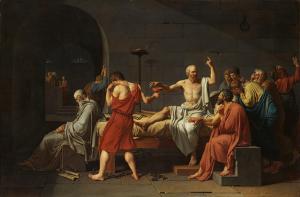
There must be someone out there who loved reading Plato right away, but I didn’t. When I read Republic, the entire book seemed needlessly complicated and full of obscure arguments advanced by an unlikable cast of characters: Socrates and his horrible students. Yet the problem was me, of course. Republic has held up for millennia because it’s good, whether I like it or not. Plato is beyond my judgments of him.
Pause for a minute and consider how obvious this truth is. Plato helped found philosophy. Much of what we believe is either something that he discovered or another philosopher’s reaction to his errors. No sane person can question his greatness or importance. Americans, however, aren’t used to reacting to art with humility.
Say my first response to a movie is, “I didn’t like it.” This may be true. I’m entitled to my likes and dislikes. But my emotional reaction to the film says nothing about its quality or importance. Sometimes a film is very good, but over my head. Sometimes I am simply in a bad mood. My mood doesn’t change the movie.
Yet when was the last time you heard someone say, “I bet that was a great movie; I just didn’t get it”? Probably rarely, if ever. Most Americans have been taught that our feelings about a work of art are the most important facts about it. But this is dangerous, especially when it comes to something from another place, culture, and time.
It’s easier for us to see this truth when we consider people who are different from us. When it comes to people, most of us recognize that we must overcome any prejudice or sense of “strangeness” that we feel and learn to love them as they are… or learn to learn to love them!
What I’m suggesting is simple: we must learn to treat strange-feeling human art, like Plato’s dialogues, with the same kind of humble respect with which we treat other people.
Perhaps the most liberating thing I have learned in a lifetime of reading books is that I must find what is lovable in a work of art first, before I criticize it. When I learned to come to Plato with humility, a whole world of joy opened up to me.
So, here’s my advice: Just read Plato, trustingly. Don’t be controlled by anything I say, and don’t give too much weight to your first feelings. Just read Plato, as he is. Three guidelines might help get you started.
Remember that Plato writes dialogues. These texts are works of dramatic fiction. Never forget this as you go. Plato is not describing an actual conversation, but a literary one. Imagine that you are reading a script for a play taking place in your mind.
Argue with the text. Dialogues are written precisely to get you to respond to them, like a play would. Don’t just agree with what you read and take notes. Plato wants to bore you, make you mad, get you to react. And he’s good at it. Speak back to the text as if you were there with Socrates’ students. If the students seem dull, suggest what they should have said. If Socrates seems wrong, tell him so. Plato wanted his writing to feel alive.
Notice that the dialogue is both simple and remarkably complicated. Plato was a world class genius; people like CS Lewis, Dorothy Sayers, or Tolkien spent their lifetime trying to understand him. He is capable of writing so that anyone can understand some of what he is saying, while also writing with a depth and care that is startling.
Here is a simple pattern for reading a Platonic dialogue:
- Read the dialogue quickly. Highlight only the most important bits.
- Go back and read the highlighted bits. What do they have in common? What kept catching your attention?
- Read the dialogue quickly again, but read the highlighted parts slowly. Do not highlight anything new.
- Repeat the process for the rest of your life, allowing yourself new highlights and better questions!
- Start with some dialogues from early in Plato’s career as a writer: Apology and Euthyphro. Plato was still a young man trying to make sense of the murder of his teacher. How could his beloved Athens, the freest city in the world, kill the father of philosophy? He spent a lifetime thinking about the tragedy and honoring Socrates, who refused to lie, play games with tyrants, or compromise his pursuit of truth.
On any given day, we get to join him.











